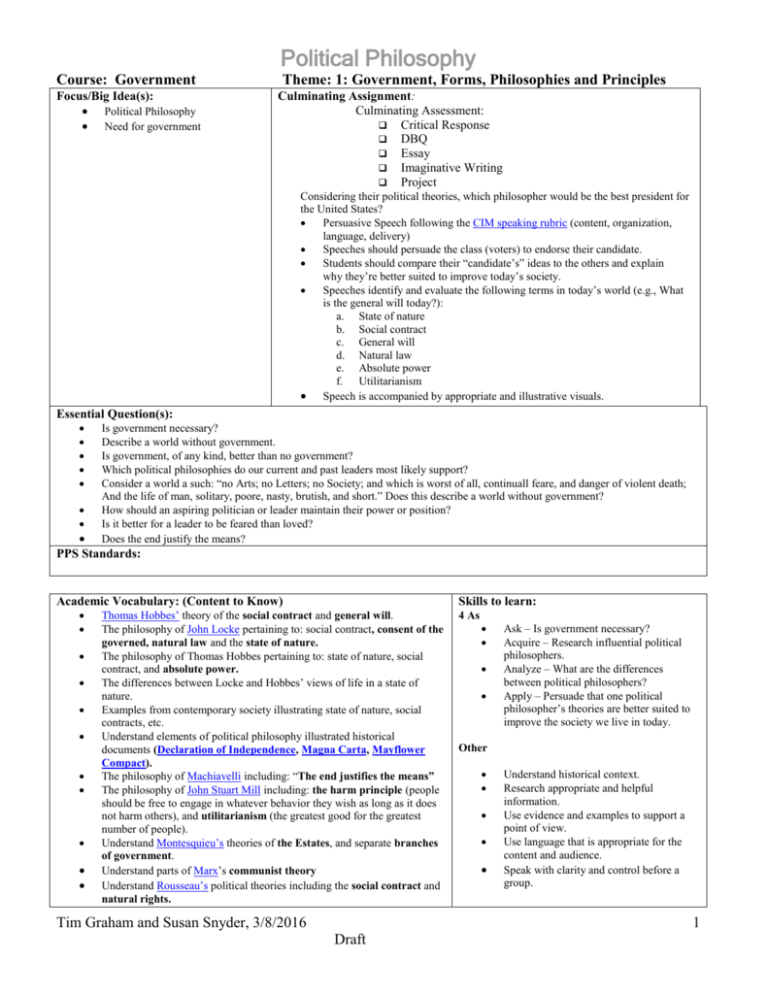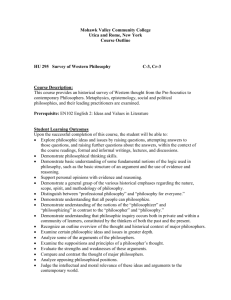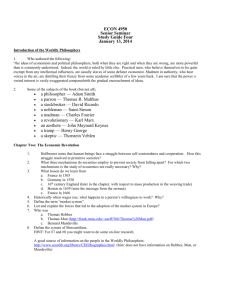Course
advertisement

Political Philosophy Course: Government Focus/Big Idea(s): Political Philosophy Need for government Theme: 1: Government, Forms, Philosophies and Principles Culminating Assignment: Culminating Assessment: Critical Response DBQ Essay Imaginative Writing Project Considering their political theories, which philosopher would be the best president for the United States? Persuasive Speech following the CIM speaking rubric (content, organization, language, delivery) Speeches should persuade the class (voters) to endorse their candidate. Students should compare their “candidate’s” ideas to the others and explain why they’re better suited to improve today’s society. Speeches identify and evaluate the following terms in today’s world (e.g., What is the general will today?): a. State of nature b. Social contract c. General will d. Natural law e. Absolute power f. Utilitarianism Speech is accompanied by appropriate and illustrative visuals. Essential Question(s): Is government necessary? Describe a world without government. Is government, of any kind, better than no government? Which political philosophies do our current and past leaders most likely support? Consider a world a such: “no Arts; no Letters; no Society; and which is worst of all, continuall feare, and danger of violent death; And the life of man, solitary, poore, nasty, brutish, and short.” Does this describe a world without government? How should an aspiring politician or leader maintain their power or position? Is it better for a leader to be feared than loved? Does the end justify the means? PPS Standards: Academic Vocabulary: (Content to Know) Skills to learn: Thomas Hobbes’ theory of the social contract and general will. The philosophy of John Locke pertaining to: social contract, consent of the governed, natural law and the state of nature. The philosophy of Thomas Hobbes pertaining to: state of nature, social contract, and absolute power. The differences between Locke and Hobbes’ views of life in a state of nature. Examples from contemporary society illustrating state of nature, social contracts, etc. Understand elements of political philosophy illustrated historical documents (Declaration of Independence, Magna Carta, Mayflower Compact). The philosophy of Machiavelli including: “The end justifies the means” The philosophy of John Stuart Mill including: the harm principle (people should be free to engage in whatever behavior they wish as long as it does not harm others), and utilitarianism (the greatest good for the greatest number of people). Understand Montesquieu’s theories of the Estates, and separate branches of government. Understand parts of Marx’s communist theory Understand Rousseau’s political theories including the social contract and natural rights. Tim Graham and Susan Snyder, 3/8/2016 4 As Ask – Is government necessary? Acquire – Research influential political philosophers. Analyze – What are the differences between political philosophers? Apply – Persuade that one political philosopher’s theories are better suited to improve the society we live in today. Other Understand historical context. Research appropriate and helpful information. Use evidence and examples to support a point of view. Use language that is appropriate for the content and audience. Speak with clarity and control before a group. 1 Draft Political Philosophy Time Frame: (in Hours) Instructional Design: Outline of lessons, in step-by-step progression. Attach additional pages. 1. Free write and discussion of one or more of the essential questions. 2. Philosophers Tea Party – a. Students are given a one page analysis of each philosopher and their work b. Students exchange information about their philosophers. c. Discuss d. Students take notes one each philosopher and turn in for grading. e. Students define and record key vocabulary and terms. 3. Using their notes from the Tea Party Students choose two or three philosophers, and make a poster Venn diagram comparing and contrasting. 4. Quiz students on philosophers and key terms. 5. In Groups, analyze historical documents and determine which philosophers and theories they may have been influenced by (Declaration of Independence, etc). 6. Discuss quiz and apply key terms and vocabulary to a contemporary model (e.g., What is the current state of nature, etc.) 7. Students pick a philosopher “candidate”, research, and prepare for speeches. Students give speeches and vote on their candidate. Resources and materials: (Text, links, videos, speakers, etc. Please note if available district-wide) Additional supports and extensions: (TAG, SPED, ESL, etc.) Article discussing Locke’s influence on Jefferson and the Declaration of Independence: http://www.crfusa.org/Foundation_docs/Foundation_lesson_declaration.htm CIM Speaking Rubric: http://www.ode.state.or.us/teachlearn/testing/scoring/guides/200506/asmtspkscorguide0506eng.pdf PPS Literacy Strategies (including Tea Party directions) http://cms9.pps.k12.or.us/teachers.pps.k12.or.us/literacy/hsliteracy/strategies .html Wikipedia online encyclopedia: http://en.wikipedia.org/wiki/Main_Page Text of Declaration of Independence: http://www.law.indiana.edu/uslawdocs/declaration.html Text of Magna Carta: http://www.fordham.edu/halsall/source/magnacarta.html Text of Mayflower Compact: http://usinfo.state.gov/usa/infousa/facts/democrac/2.htm Tim Graham and Susan Snyder, 3/8/2016 2 Draft





